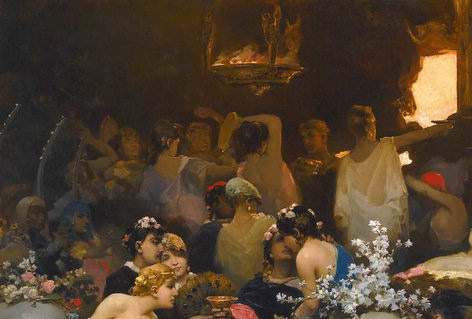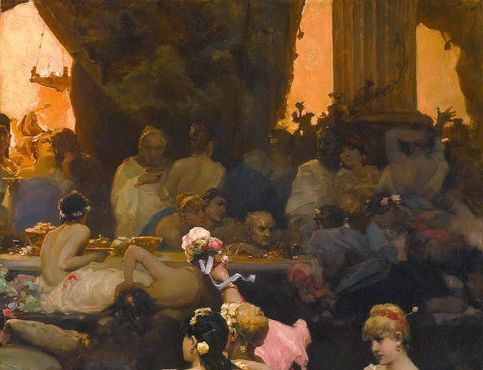The Markets
From Chapter One, Verse 1 of the Wolves of Edgewater:
in which Valen is Presented to the Contessa of Edgewater, in advance of the MarketsIn Edgewater, though, most of the Fabbre were young— second and third daughters of bigger city families, hoping to gain favor by proximity to the Contessa’s estate. For great swaths of the day they would do little more than lounge on pillow-plush clines, arranged in groups of three or four around the Contessa hall, dining and scheming until some other entertainment arrived.In the weeks before the Markets opened, this arrangement allowed them the opportunity to ogle the latest batch of boys being presented to Contessa Miran d'Alena from the best possible perspective: laying down.Despite their masks of Propriety, Valen knew the half-hundred women in the Contessa’s audience hall saw him as nothing but a bedroom plaything. A boy fit to be put on display, or to bed, and little else.But that hardly mattered, as long as they liked him.Their approval could convince the Contessa to grant him a Journeyman’s contract, and save him from the Markets.
[...]There was an eruption of laughter from the assembly of Edgewater’s Fabbre before they became a gaggle of girls. Snide jokes and rude calls rattled about the room. They assured Valen how much fun he would have with each of them, lying on his back. They laughed and clinked wine glasses, and their minds were made.It was a matter of common sense, after all. Every boy wanted his contract owned, whether he admitted it or not. High spirits would follow naturally, once he got accustomed to the riding.There was no need to upset the natural way of things. He would make a fine Life contract or, at the very least, an earnest Wager to any girl with the tin to pay Fabbra Argene’s price.
[...]Contessa Miran d’Alena downed her wine to steady her nerves.“You have trained a very fine Layman, Gian," she spoke, as if from a recitation, "I am certain he will thrive during the coming Markets. With your care and consideration, of course. W-welcome, Layman Valen. Certainly you are the pride of your trade. May you bring that pride to the houses of Edgewater, as well.”A rumble of agreement rolled around the hall.
From Chapter One, Verse 3:
In which Evere Argene escorts Valen through Edgewater town.It was still early in the day but plenty of people were out, getting ready for the invaders. For three months each year, the Gentrywomen of the Grey Empire fled the withering heat west of the Escarpment, and came to exotic Kayen. Weaving their way through the villages along the path of the fortwall, their arrival marked the beginning of the Markets in each town they visited.Down in the Trades Quarters, near the Promenade, men were airing out their tradeswomen’s best draperies and repainting signs that had been left to rot the rest of the year, but here at the foot of the Contessa’s estate, it was worse. Every shred of muslin and fustian was replaced with silken and velvet. And brocade. Cold stars, these women loved their brocade. They walked through the streets like peacocks on full display, as if their estates couldn’t be expressed in stone and mosaic, alone.Every street in the Gentry Quarter gleamed. Not just the columns and brass, Wagers from all across the province were being paid to sweep honest filth off the street, out of sight. So witch-damned clean, her boots were clicking on the blue-grey pavestone. As if mud was too Lay. As if these gentry ladies, or even their horses, never needed to squat!The whole sensation of fraud, passing off tin as silver, gnawed at Evere’s self control. She knew what hid behind all those Gentry smiles. And Evere Argene could smile and pass along sympathetic glances as well as any of them.
[...]Evere sighed as... they crossed the threshold of the Trades Quarters and when she spoke, her voice was soft and controlled.“Try not to take all this so very hard, Val. The Markets can be fun, if you put your mind to it.”He shrugged; couldn’t look her in the eye. Evere could hardly blame him. It was a raucous, insufferable time. She had little stomach for it, herself. This season, like the past three, she would likely find the most obnoxious Inranan oil-sucker and challenging the girl to a neighborly fist fight. She might even wait for her victim to accept, before throwing fists.
[...]Evere raked her hand through her hair and struggled to think of something else to say. When she tried, it was her father’s words that tumbled from her lips.“These feelings will soften, Val, I promise. In time you will learn to accept what must be.” The words hadn’t helped her; they weren’t going to help him. Some feelings couldn’t be blunted.She fished through the pockets of her fitted riding trousers.“Here now, here. I know what will put your spirits right up!” Pulling out a silver soldi, she handed it to Valen. “Just this morning I saw the first stalls opening up along the Promenade. Ice licks and wooden flutes and meat pies, at least! A whole cup of wine, or perhaps a new cap? Why, a man isn’t hardly anything without a fine cap! Just buy whatever you like, today, and don’t save a cinq for tomorrow!”She held her smile fiercely as he took the coin from her. Of all people, Evere knew what it meant to desire the impossible, to want something beyond the natural way of things. The boy had every reason to be bitter, if only he could keep it all to himself. He was an adult now, and it was time he learned how to drown his sorrows in trinkets and wine.
From Chapter One, Verse 4 of the Wolves of Edgewater:
Wherein Valen describes the markets in ghoulish detail.Edgewater was infected with Inranan gentry in town for the Markets and more trundled in from the Fortwall every day.At half-past luncheon they would shamble out of bed and into any salon or stall that struck their fancy. The whoring and drinking would carry on until well into the afternoon. They spent the next several hours in languid sprawls, right on the ground on the public green, there to sleep in the shade or watch marketable men compete in sporting conversations.These conversations, neither game, nor dance, used intricate choreography to mimic ancient competitions of skill. Winners were not those who scored, or pinned, or drew blood, but whose precision and accuracy to the form were most perfect.As night broke, the local Gentry hosted lavish balls for their sisters from the west. Full of dining and dancing, the Inranans kept local boys out until well beyond the Witch’s hour, offering promises they had no intention of keeping. Hearts and reputations littered the streets like broken glass and pottery as the sun finally rose.All to be repeated in the new day.True, eligible matches could be made. A son of country gentry could move up in society if his honor was in tact and he could flaunt his talents without strutting. But for the Layman, attracting the eye of a gentrywoman might be the only way to justify his padrona’s asking price. For three or four seasons, if they were lucky, they walked the stiletto’s edge between marketability and ruin. All for the laurels of being owned.
[...] He released a long, slow breath as the ground flattened out and Square Tristez opened up in front of him. Smells of frying bread and dying fish mingled with expensive Inranan perfume and the musk of hard working tradeswomen. Stalls of garish painted wood filled the paved square, forcing everyone through snaking pathways. The tradeswomen called out to passersby while their men played flutes or bowed their three-stringed rebecs. A hunting trap for the seasonists.Beyond the square, the Promenade stretched along River Vermes. Gentrywomen strolled the wide gravel path between the water and the public green, the gentle breeze dancing with the hems of their long, colorful robes. Their shimmering silken fans flapped idly as they talked of contract proposals or the fighting in Tratafoio. They sipped wine and perused the stalls, pulling endless streams of coin from even deeper trouser pockets to buy gifts for whatever boy caught their fancy.A smartly dressed officina, her waist-length tergus and fitted trousers, crisp and newly spun, laughed her face red while a bouquet of young men wrestled and danced for her amusement. For a long while, Valen hovered at the edge of the little gathering, willing himself to belong.
History
The Origins of the Contract Market:
The Market Season:
Components and tools
Participants
Presentation
the Bill and Coo
Signings
What Your Daughter Can Expect:
What is a Contract:
- Life: A life contract, as it sounds, bonds the man to you for life, and no woman may make a claim on his labor, without your consent. The cost of a life contract depends on the value of the man, but even the most modest catch would set a woman back a healthy bit of tin.
- Wage: A wage contract is for those men unfit, or unskilled enough to be worth the cost of a life contract. Their Mistress or Mother will negotiate a price and time frame for which he will be bonded to your service. Most men are "Wagers", so if you see one you like, it is easy enough to find out when he'll be available.
- Army: An Army contract is for men who aren't worth a tinker's damn. Too crass, too dull-witted, or too unwilling to be ridden. A stubborn man is best broken in the Army, fighting the Ironeaters in the Sea Forlorne.
- Journeyman: A journeyman's contract is a rare thing. Sometimes, a man's price is too high. His Skills unequaled, except when measured against his beauty, grace, and charm. Other times, a man's lineage is too dubious to risk another contract, but again his talents are too dear for the Army. In such, rare, cases a man may be able to receive a Journeyman's contract. As a Journeyman, he is given liberty to negotiate his own contracts, and affords his Mistress or Mother only a percentage of any income he receives. In this way, he repays his debts to the woman who protects him, without burdening her with finding suitable contracts.
Remove these ads. Join the Worldbuilders Guild















I had a lovely read with your luscious narrative! I really felt immersed in this type of festivity, and appreciated seeing Valen's perspective on the event.
I've always loved the juxtiposition between "local" and "tourist", and how a place that relies on outside money becomes (intentionally or not) a sort of themepark or pleasure island, completely detatched from the reality of life living there.... And how visitors can't tell the difference, can't see the desperation or the "act" that's being performed for their benefit. It's very post-colonial, in that respect. thanks for the comment! :)